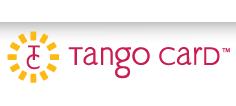Tango Card, the Seattle startup looking to disrupt the loyalty/gift card space by acting as a low-cost aggregator and innovator on delivery formats, has picked up a couple of new dancing partners. Innovation Endeavors, Eric Schmidt’s early-stage investment firm; and Maurice Werdegar, CEO of WTI, the venture debt firm that has counted companies like Google and Facebook among its portfolio, are investing $1.8 million in the company.
The investment comes on the back of a strong period for three year-old Tango Card. The company is on track to reach 600,000 users by the end of this year, with key clients like FedEx, ShutterFly and Microsoft (more on that below) among those behind the growth in an overall industry projected to be worth $20 billion this year.
David Leeds, the founder and CEO, says that the new funds — part of a Series A expansion — will be used to continue to build out Tango’s business, with specific focus on mobile technology and “the use of digital goods in retail.” It’s also, apparently, staffing up: it has just hired Randy Fennel, previously GM of technology for Westpac and Boeing Joint Strike Fighter IT director, as its new CTO.
The total raised to date by Tango Card now stands at $2.8 million, with previous funds coming, Leeds says, from friends and family.
Since launching in August 2009, Tango Card’s business — essentially making the growing patchwork of gift card and loyalty programs more useful to people by offering cards and a mobile app that let users redeem the values through a number of reward/loyalty programs — has been developing on a few fronts.
(And given how many companies want to play in the loyalty/rewards space — from credit card companies to individual retailers, to startups coming from mulitple different directions like Facebook’s new acquisition Karma, Wrapp and and recent TC Disrupt finalist Cardify among them, a multi-leveled approach may well be what keeps the company going strong as consolidation takes place among all the rest.)
On the one hand, Tango has created a mass market business by powering the loyalty programs for a number of brands. Its largest customer at the moment is Microsoft, which uses Tango Card to power Bing Rewards, which Microsoft devised to incentivize people to use Bing to search instead of, say, Google.
Users who accrue credits can redeem them either for gift cards for a selection of retailers like Amazon and Starbucks, donations to charities or for Xbox Live credits. While physical gift cards typically come in denominations of $50-$100 and can take weeks to arrive, Tango’s rewards come instantly and are in much smaller denominations, $2-$5 typically.
“We wanted to rethink how rewards are given in the modern world,” says Leeds. “This may only be one-tenth the value of traditional cards, but they are used more frequently.”
Significantly, you may see more of this coming to Microsoft properties in the months ahead. Tango is working with the company on other services — and although Leeds wouldn’t say on what, you could imagine how virtual giftcards and gifting could be worked into other Microsoft services, from Xbox games to Skype and perhaps apps as well.
Tango Card’s model around giftcards is also being worked into enterprise offerings. One recent example is in a recent integration with Salesforce.
Launched three weeks ago, the idea is simple, says Leeds. “U.S. sales and marketing teams spend billions of dollars already on giftcards for internal people, for business prospects, and so on. At the same time, these people live inside Salesforce, day in day out. Now, these people can buy the Tango gift card directly within Salesforce.”
He points out that Tango is basically making gift card buying easier but also more effective: “Now, that activity [of buying the card] has been captured with a person’s name, and the business intelligence that comes along with that.” Users can also automatically expense those gift cards all in the same application.
Other business ideas are still a work in progress. A personalised experience on the mobile app called “What I Got” launched in December is getting used “but not nearly as much” as other parts of the mobile app (activate, spend, aggregate gift cards). Leeds says they are changing how the function is “wired” into the rest of the app by tying it more closely to spending.
Margins on Tango Card’s services are a “solid” 10 percent, says Leeds. He says this is higher than those for a typical retailer because credit card charges can eat into margin. “We are almost always paid by our large partners via wire/ACH/check, which have low or no fees.” He also points out that unlike other companies that run loyalty programs and add 20-30 percent to the cost of a price of a reward product, Tango charges no “ridiculous” fee.
WTI notes that one of the big selling points for investing in Tango Card was the track record of its founder: David Leeds had started FiberTower, the wireless infrastructure company that eventually went public, and raised $225 million in equity and $400 million in debt, and claiming the title of largest private equity raise of 2005, according to Leeds.
Ironically, Tango Card is anything but that: “We’ve spent just over $1 million since our launch in 2010. Our investments are in people and software applications, and we are building an all-digital platform. It’s incredibly capital efficient, it’s defensible, and it’s hugely scalable,” says Leeds.
